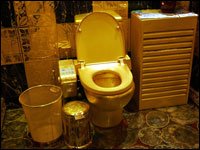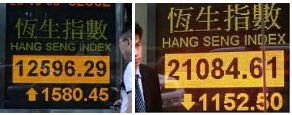Like kids, analysts say the darndest things. It sometimes seems as if they are in competition with each other not to make correct forecasts but just to attract attention.
 One at Barclays recently created a stir by declaring that Hong Kong will have re-pegged its dollar to the Yuan within 12 to 24 months. The peg to the US Dollar has drawbacks, and when there is a hopeless mismatch between American monetary policy and our local economic conditions – thus such things as a property bubble – people inevitably chatter about alternative arrangements. But a link to a non-convertible, manipulated, non-reserve bit of paper with Mao on it that has zero role in international trade? Perhaps he was impressed at the sight of the Big Lychee’s taxi drivers and 7-Elevens happily accepting Mainland money. (Hint: RMB1 is worth HK$1.16.) Or, more likely, he thought “this’ll get me in the headlines,” a forecast that of course proved spot-on.
One at Barclays recently created a stir by declaring that Hong Kong will have re-pegged its dollar to the Yuan within 12 to 24 months. The peg to the US Dollar has drawbacks, and when there is a hopeless mismatch between American monetary policy and our local economic conditions – thus such things as a property bubble – people inevitably chatter about alternative arrangements. But a link to a non-convertible, manipulated, non-reserve bit of paper with Mao on it that has zero role in international trade? Perhaps he was impressed at the sight of the Big Lychee’s taxi drivers and 7-Elevens happily accepting Mainland money. (Hint: RMB1 is worth HK$1.16.) Or, more likely, he thought “this’ll get me in the headlines,” a forecast that of course proved spot-on.
So what should we make of yesterday’s report that Goldman Sachs thinks the Federal Reserve’s quantitative easing will push the Hang Seng Index up to 29,000 by this time next year?
There is a bit more logic to it, if only because we already know that QE has this effect. Indeed, some might say the prediction of 20% further upside is distinctly un-profound. It would be 30% or 40% had it not already been priced in. Before I was halfway through the item, I thought “Sun Hung Kai.” It’s almost the default Hong Kong asset price bubble play. Unfortunately, the Goldman Sachs people said so too, and the stock finished 6% up yesterday.
I’m already pretty much fully invested in local blue chips, local mid-caps and exotically flavoured, index-tracking, emerging-market and commodities ETFs, so I’ll just sit back and enjoy the ride. But I can’t help wondering what the ideal Hong Kong portfolio should contain at this time. The Goldman analyst also mentions Hong Kong Exchanges and Clearing as another beneficiary of the wall of hot money. But what about the non-obvious – the laggards that will start catching up after all the zombies have piled into the Index constituents?
And then the other question: when to get out? Unlike small-potato property investors, holders of equities can easily sell portions of their portfolio into a rising market. The 29,000 target looks as good as any, though a better indicator of when to be fearful might be others’ greed, as Warren Buffet puts it. If housewives start taking out second mortgages to put into the stock market, for example, maybe it’ll be time to go. It depends how long QE continues, interest rates stay low, etc, etc. What does Goldman Sachs think about the period 12 to 24 months out? Another 20%?
Ultimately, this is artificial. At some stage, presumably within our lifetimes, Americans will start spending again, interest rates will have to rise, the US Dollar may even recover, and aberrant Hong Kong asset prices will fall back in line with realistic values. Equities investors can look after themselves. They have strong stomachs (prime stock-pick HKEx’s Chairman is Ronald Arculli, for heaven’s sake). The government doesn’t care about us. Our leaders just worry endlessly about the precious property owners, who are, after all, customers of even-more precious tycoons, serfs of our noble banks and too blinkered or innumerate to foresee mortgage payments rising. Oh, and many are civil servants and top officials. They are the ones who will bleat, demand that the government suspend the laws of gravity, throw themselves off bridges, and generally be insufferable when the inevitable happens. Again. Maybe Mr Yuan-peg at Barclays has a point.
There is one type of investor (or at least speculator, but who isn’t one now?) no-one cares two hoots about. I found myself having lunch opposite one of these people a while ago. “Gold,” he hissed between sips of Perrier and mouthfuls of wild smoked salmon. “Fiat currencies.”
 The theory is that printing all this money to ward off deflation will really cause massive inflation, debasing the planet’s currencies into nothing. (The economist’s response is that printing money doesn’t cause inflation until and unless people actually start spending it, which is why we need to hold on tight when interest rates suddenly, eventually, go up.) Money will be worthless: yellow metal, plus perhaps land, will be the only thing left with any value. Many genuinely believe this apocalyptic scenario, which has melded into the conspiracy theories and other psychological disorders spread on the Internet.
The theory is that printing all this money to ward off deflation will really cause massive inflation, debasing the planet’s currencies into nothing. (The economist’s response is that printing money doesn’t cause inflation until and unless people actually start spending it, which is why we need to hold on tight when interest rates suddenly, eventually, go up.) Money will be worthless: yellow metal, plus perhaps land, will be the only thing left with any value. Many genuinely believe this apocalyptic scenario, which has melded into the conspiracy theories and other psychological disorders spread on the Internet.
“If you really believe this,” I told the gold bug, “you should be buying water purification tablets and fish hooks, shouldn’t you?” But he stood by his obsession: an inedible substance with little or no practical use and which – the ultimate crime in my book – produces no dividends. The fact is that there is a surprisingly small amount of this element around. If every unintelligent rich person in the world buys a few ounces, the price rockets, and there is (perhaps was) money to be made in anticipating that. But it is not magical, and it obeys the laws of gravity.
The market has opened. Up 300 points or so. Déjà vu. Let’s just see if we can get the timing a bit closer to perfect this time round.


Re-pegging to RMB makes economic sense, unfortunately it is probably not technically possible given RMB isn’t yet fully convertible.
I think the funny thing about the economy right now is that, the developed economies are still full of un-resolved problems, but all the money has been pouring into the system to keep all these assets higher. I am really not quite sure if this can be sustainable…
Your point about 29000 and greed is an interesting one. I know plenty in HK who have no understanding of how markets actually work. 29000 will be my exit point, but not for many. Its amusing to hear their lamentations afterwards.
The Basic Law requires HKD to be 100% reserve fund backed, freely convertible and does not require any link at all. The RMB convertibility point is bunk.
Have been a gold bug for 6 years, predicted in 2008 that the Hang Seng would fall from 30k to 12k and now predict that the Hang Seng will be back to 12k in 2012 once the US banks’ go under for the second and final time and 2 yr interest rates move up to 1%.
Gunlaw – have you thought about establishing a fund to attract third party capital? Investors would no doubt tolerate very high fees to gain access to investment prowess of the levels you have displayed over the last few years.